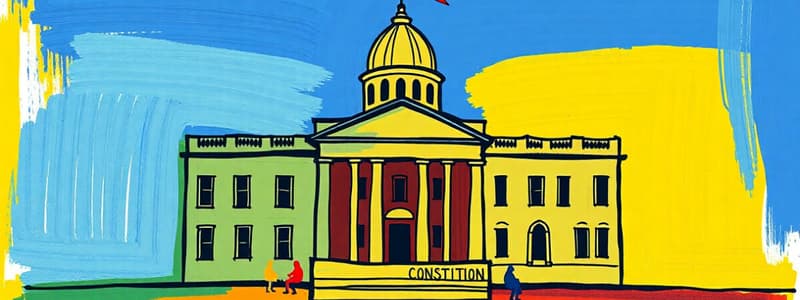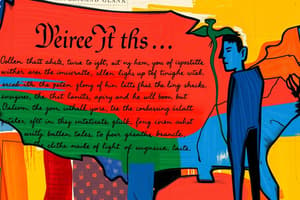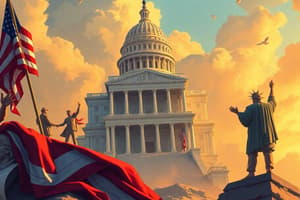Podcast
Questions and Answers
What is a primary source?
What is a primary source?
A first hand account
What is a secondary source?
What is a secondary source?
Information gathered by someone who did not take part in or witness an event
What is an artifact?
What is an artifact?
A man-made object from the past
What is citizenship?
What is citizenship?
What does citizenship entail?
What does citizenship entail?
How many amendments does the Constitution have?
How many amendments does the Constitution have?
What is the bill of rights?
What is the bill of rights?
What makes up the constitution?
What makes up the constitution?
What type of economic system does the U.S. have?
What type of economic system does the U.S. have?
What does someone have to do to become a US citizen?
What does someone have to do to become a US citizen?
What are the basic parts of the US government?
What are the basic parts of the US government?
Where did democracy start?
Where did democracy start?
What is a polis?
What is a polis?
What words came from Polis?
What words came from Polis?
What was a polis like?
What was a polis like?
Which of these options are correct? (Select all that apply)
Which of these options are correct? (Select all that apply)
What is a monarchy?
What is a monarchy?
What did the Ancient Greek monarchy look like?
What did the Ancient Greek monarchy look like?
What is tyranny?
What is tyranny?
What did Ancient Greek tyranny look like?
What did Ancient Greek tyranny look like?
What did Ancient Greek oligarchy's look like?
What did Ancient Greek oligarchy's look like?
What is democracy?
What is democracy?
What are the two types of democracy?
What are the two types of democracy?
What kind of democracy did Ancient Greece have?
What kind of democracy did Ancient Greece have?
What is a direct democracy?
What is a direct democracy?
What is a representative democracy?
What is a representative democracy?
What was the acropolis and where was it?
What was the acropolis and where was it?
What was the agora in Athens?
What was the agora in Athens?
Who could be a citizen in Athens?
Who could be a citizen in Athens?
How were laws made in Athens?
How were laws made in Athens?
How does Pericles describe Athenian democracy?
How does Pericles describe Athenian democracy?
What kind of citizen does Pericles believe democracy produces?
What kind of citizen does Pericles believe democracy produces?
What changes did Solon's reform make to Athenian democracy?
What changes did Solon's reform make to Athenian democracy?
What was the Boule?
What was the Boule?
What was another name for the ecclesia
What was another name for the ecclesia
Why did the Greeks create ostracism?
Why did the Greeks create ostracism?
Who was a citizen in Rome?
Who was a citizen in Rome?
How did citizens participate in democracy in Rome?
How did citizens participate in democracy in Rome?
What protections against autocracy or tyranny did Rome introduce?
What protections against autocracy or tyranny did Rome introduce?
What is a representative democracy also known as
What is a representative democracy also known as
What was a Roman tribune?
What was a Roman tribune?
What was the Roman senate?
What was the Roman senate?
What are patricians?
What are patricians?
What was the Roman constitution?
What was the Roman constitution?
What does demos mean?
What does demos mean?
What does democracy literally mean?
What does democracy literally mean?
What was the mytilenean revolt?
What was the mytilenean revolt?
How did Athens decide to retaliate?
How did Athens decide to retaliate?
What happened after Athens decided their retaliation to the Mytilenean revolt?
What happened after Athens decided their retaliation to the Mytilenean revolt?
How is the Mytilenean revolt an example of the dangers of democracy?
How is the Mytilenean revolt an example of the dangers of democracy?
What are some differences between US and Athenian democracy?
What are some differences between US and Athenian democracy?
What is the ring of Gyges story?
What is the ring of Gyges story?
What is the moral of the ring of Gyges?
What is the moral of the ring of Gyges?
According to Plato what are the three parts of the soul?
According to Plato what are the three parts of the soul?
What parts of the soul correlate with what parts of the state?
What parts of the soul correlate with what parts of the state?
What is the order of Greek philosophers?
What is the order of Greek philosophers?
What was Socrates' dialectical method?
What was Socrates' dialectical method?
What was Socrates' goal?
What was Socrates' goal?
Who created the original settlements of Rome?
Who created the original settlements of Rome?
Who established colonies along southern Sicily and Italy and when?
Who established colonies along southern Sicily and Italy and when?
Who were the Etruscans?
Who were the Etruscans?
What are the 4 parts that make up a republic?
What are the 4 parts that make up a republic?
What was Rome's first written law code?
What was Rome's first written law code?
What was the executive system for Rome?
What was the executive system for Rome?
What was the Roman legislative system?
What was the Roman legislative system?
What was the Roman centuriate assembly?
What was the Roman centuriate assembly?
What was the Roman tribal assembly?
What was the Roman tribal assembly?
What was the Roman judicial system?
What was the Roman judicial system?
What were the Punic Wars?
What were the Punic Wars?
What was a Roman dictator?
What was a Roman dictator?
What is a Roman Legion?
What is a Roman Legion?
What did a Roman soldier receive after retirement?
What did a Roman soldier receive after retirement?
Who was in the first triumvirate?
Who was in the first triumvirate?
What was Caesar's progression of power?
What was Caesar's progression of power?
What laws did Caesar pass to gain popularity?
What laws did Caesar pass to gain popularity?
What was a major event of the Punic wars?
What was a major event of the Punic wars?
How did Rome retaliate against Hannibal's attack in the Punic wars?
How did Rome retaliate against Hannibal's attack in the Punic wars?
Where is Gaul today?
Where is Gaul today?
How did Caesar die?
How did Caesar die?
Who was in the second Roman triumvirate?
Who was in the second Roman triumvirate?
Who did Marc Antony marry?
Who did Marc Antony marry?
What is Pax Romana?
What is Pax Romana?
When was the Pax Romana?
When was the Pax Romana?
What was the main idea of Pericles' funeral speech?
What was the main idea of Pericles' funeral speech?
What is ecclesia?
What is ecclesia?
What were archons?
What were archons?
Who was appointed to make the first set of laws in Athens and how did that turn out?
Who was appointed to make the first set of laws in Athens and how did that turn out?
What was Plato's criticism of democracy?
What was Plato's criticism of democracy?
What was Plato's criticism of oligarchy?
What was Plato's criticism of oligarchy?
What was Plato's criticism of tyranny?
What was Plato's criticism of tyranny?
What was Madison's criticism of direct democracy?
What was Madison's criticism of direct democracy?
What did Plato think the ideal form of government was?
What did Plato think the ideal form of government was?
What was Socrates' central belief?
What was Socrates' central belief?
Flashcards
What is a primary source?
What is a primary source?
A first hand account
What is a secondary source?
What is a secondary source?
Information gathered by someone who did not take part in or witness an event
What is an artifact?
What is an artifact?
A man-made object from the past
What is citizenship?
What is citizenship?
Signup and view all the flashcards
What does citizenship entail?
What does citizenship entail?
Signup and view all the flashcards
How many amendments does the Constitution have?
How many amendments does the Constitution have?
Signup and view all the flashcards
What is the bill of rights?
What is the bill of rights?
Signup and view all the flashcards
What makes up the constitution?
What makes up the constitution?
Signup and view all the flashcards
What type of economic system does the U.S. have?
What type of economic system does the U.S. have?
Signup and view all the flashcards
What does someone have to do to become a US citizen?
What does someone have to do to become a US citizen?
Signup and view all the flashcards
What are the basic parts of the US government?
What are the basic parts of the US government?
Signup and view all the flashcards
Where did democracy start?
Where did democracy start?
Signup and view all the flashcards
What is a polis?
What is a polis?
Signup and view all the flashcards
What words came from Polis?
What words came from Polis?
Signup and view all the flashcards
What was a polis like?
What was a polis like?
Signup and view all the flashcards
What are the 4 types of government?
What are the 4 types of government?
Signup and view all the flashcards
What is a monarchy?
What is a monarchy?
Signup and view all the flashcards
What did the Ancient Greek monarchy look like?
What did the Ancient Greek monarchy look like?
Signup and view all the flashcards
What is tyranny?
What is tyranny?
Signup and view all the flashcards
What did Ancient Greek tyranny look like?
What did Ancient Greek tyranny look like?
Signup and view all the flashcards
What is an oligarchy?
What is an oligarchy?
Signup and view all the flashcards
What did Ancient Greek oligarchy's look like?
What did Ancient Greek oligarchy's look like?
Signup and view all the flashcards
What is democracy?
What is democracy?
Signup and view all the flashcards
What are the two types of democracy?
What are the two types of democracy?
Signup and view all the flashcards
What kind of democracy did Ancient Greece have?
What kind of democracy did Ancient Greece have?
Signup and view all the flashcards
What is a direct democracy?
What is a direct democracy?
Signup and view all the flashcards
What is a representative democracy?
What is a representative democracy?
Signup and view all the flashcards
What was the acropolis and where was it?
What was the acropolis and where was it?
Signup and view all the flashcards
What was the agora in Athens?
What was the agora in Athens?
Signup and view all the flashcards
Study Notes
Primary and Secondary Sources
- Primary source: First-hand account of an event.
- Secondary source: Information gathered by someone who did not witness the event.
Artifacts
- Man-made object from the past.
Citizenship
- The relationship between an individual and a state.
- Citizen owes loyalty to the state and is entitled to rights and protections.
US Constitution
- 27 amendments.
- Bill of Rights: First 10 amendments.
- Constitution comprised of the Preamble, 7 Articles, and 27 amendments.
US Economic System
- Capitalism and free market.
US Citizenship Requirements
- Satisfy legal requirements.
- Learn English.
- Learn US government.
- Learn US history.
- Pass interview and test.
US Government Structure
- Three branches of government.
- Separation of powers.
- Checks and balances.
- Federalism.
- Election cycles.
Democracy Origins
- Ancient Greece.
Polis
- Political and social structure in ancient Greece (city-state).
- Derived into words like "policy" and "politics."
- Isolated, strong communities, politically and economically independent.
Types of Government
- Monarchy, tyranny, oligarchy, democracy.
Monarchy
- King or queen rules, power inherited.
Tyranny
- One person rules without legal right, often gained through promises.
Oligarchy
- Small group rules.
- Usually wealthy elites.
Democracy
- Citizens share ruling power.
Types of Democracy
- Direct democracy: Citizens rule directly.
- Representative democracy: Citizens elect representatives.
Ancient Greek Democracy
- Direct democracy.
Direct Democracy
- Citizens rule directly, not through representatives.
Representative Democracy
- Citizens elect others to represent them.
Athenian Acropolis and Agora
- Acropolis: Town center in Athens.
- Agora: Central area for Athenian government.
Athenian Citizenship
- Free, native-born adult males.
- Parents must be Athenian citizens.
Athenian Citizenship Exclusions
- Slaves, former slaves, women, children.
Athenian Lawmaking
- Assembly (Ecclesia) of randomly selected citizens voted on issues.
Pericles' View of Athenian Democracy
- A model for others with power held by the people who respect the system.
- Produces versatile and graceful citizens.
Solon's Reforms
- Abolished debt slavery.
- Expanded ecclesia powers.
- Created Boule.
- Allowed citizens to challenge archons.
- Expanded archon positions to more classes.
Boule
- Council of 400 Athenian citizens who planned assembly discussions.
- Ran daily affairs of Athens.
Ecclesia
- Assembly.
Ostracism
- Athenian practice to prevent tyranny.
Roman Citizenship
- Free, native-born adult males.
- Certain females with married parents in certain areas of Rome.
- Freed slaves gained citizenship.
- Children of citizens.
Roman Democratic Participation
- Representative democracy (republic); citizens elect representatives.
Roman Protections Against Tyranny
- Two consuls with veto power.
- One-year terms for consuls.
- Senate approval needed.
Republic
- Representative democracy.
Roman Tribune
- Elected official from the plebeian class, with veto power over senate laws.
Roman Senate
- Legislative body of patricians.
- Life-long terms.
- Controlled foreign and finance policies, advised consuls.
Roman Centuriate Assembly
- Citizen-soldiers.
- Elected consuls and praetors, made laws.
Roman Tribal Assembly
- Citizens grouped by location.
- Elected tribunes, made laws.
Roman Judicial System
- Praetors: 8 judges, one-year terms.
- Oversaw criminal and civil courts in Rome or governed provinces.
Punic Wars
- Series of three wars between Rome and Carthage.
Roman Dictator
- Official with ultimate power during crises.
- 6-month term.
- Chosen by consuls or senate
Roman Legion
- Military unit of 5,000 infantry, supported by cavalry.
Roman Soldier Retirement Benefits
- Plots of land.
First Triumvirate
- Caesar, Pompey, Crassus.
Caesar's Rise to Power
- Consul.
- Governor of Gaul.
- Dictator.
- Dictator for life.
Caesar's Popular Laws
- Granted citizenship to provinces.
- Expanded senate.
- Increased soldier pay.
- Created jobs.
Hannibal's Punic War Strategy
- Led army around Italy in sneak attack
Rome's Response to Hannibal
- Burned Carthage, enslaved population.
Gaul's Modern Location
- France.
Caesar's Death
- Stabbed in the Senate.
Second Triumvirate
- Marc Antony, Lepidus, Octavian (Caesar Augustus).
Marc Antony's Marriage
- Cleopatra.
Pax Romana
- Roman peace.
Pax Romana Period
- 27 BC to 180 AD.
Pericles' Funeral Speech Main Idea
- Athenian democracy is best because many participate and follow rules out of respect
Ecclesia
- Athenian civic assembly for discussion and voting
Archons
- Group of 9 leaders from rich families that ruled for 1 year in Athens
Draco's Laws and Outcome
- First Athenian laws, but were harsh and unfair
Plato's Criticism of Democracy
- Too much freedom leads to poor decisions.
- Unrealistic desires differ from reality.
Plato's Criticism of Oligarchy
- Inequality; too much wealth in few hands.
Plato's Criticism of Tyranny
- Lack of freedom.
Madison's Criticism of Direct Democracy
- Promotes factionalism.
Plato's Ideal Government
- Intelligent elite lead (an oligarchy).
Socrates' Core Belief
- Examine every aspect of your life
Founding Romans
- Latins
Greek Colonies in Italy
- 750-600 BC
- Established settlements.
Etruscans
- Skilled metalworkers, engineers.
- Influenced Rome.
Republic's Four Parts
- Citizen power, elected officials, citizen accountability, rule by law
Rome's First Written Code
- Twelve Tables
Roman Executive System
- Two consuls with one-year terms; led the army and government.
Studying That Suits You
Use AI to generate personalized quizzes and flashcards to suit your learning preferences.




